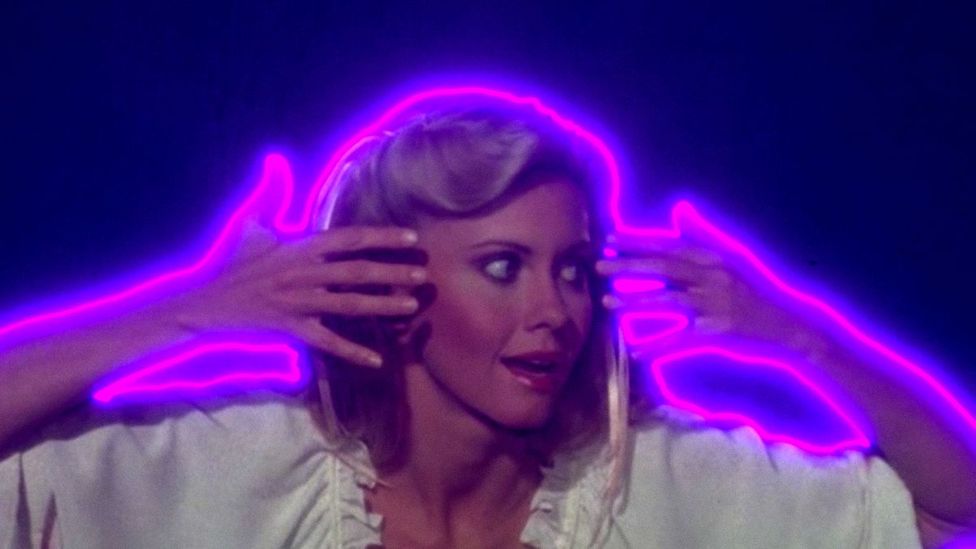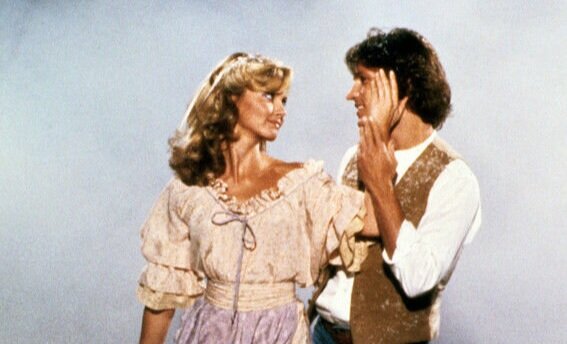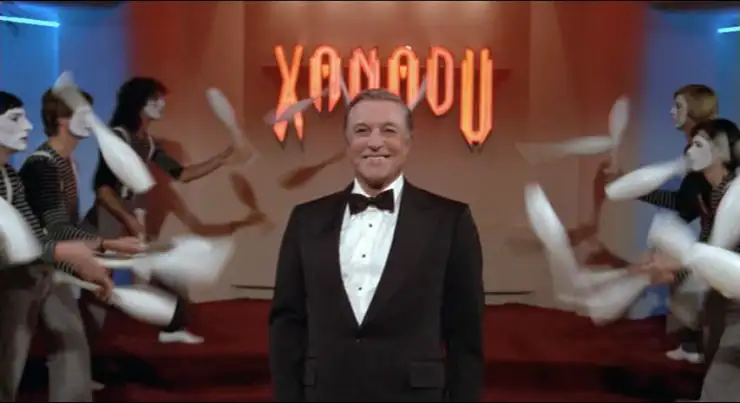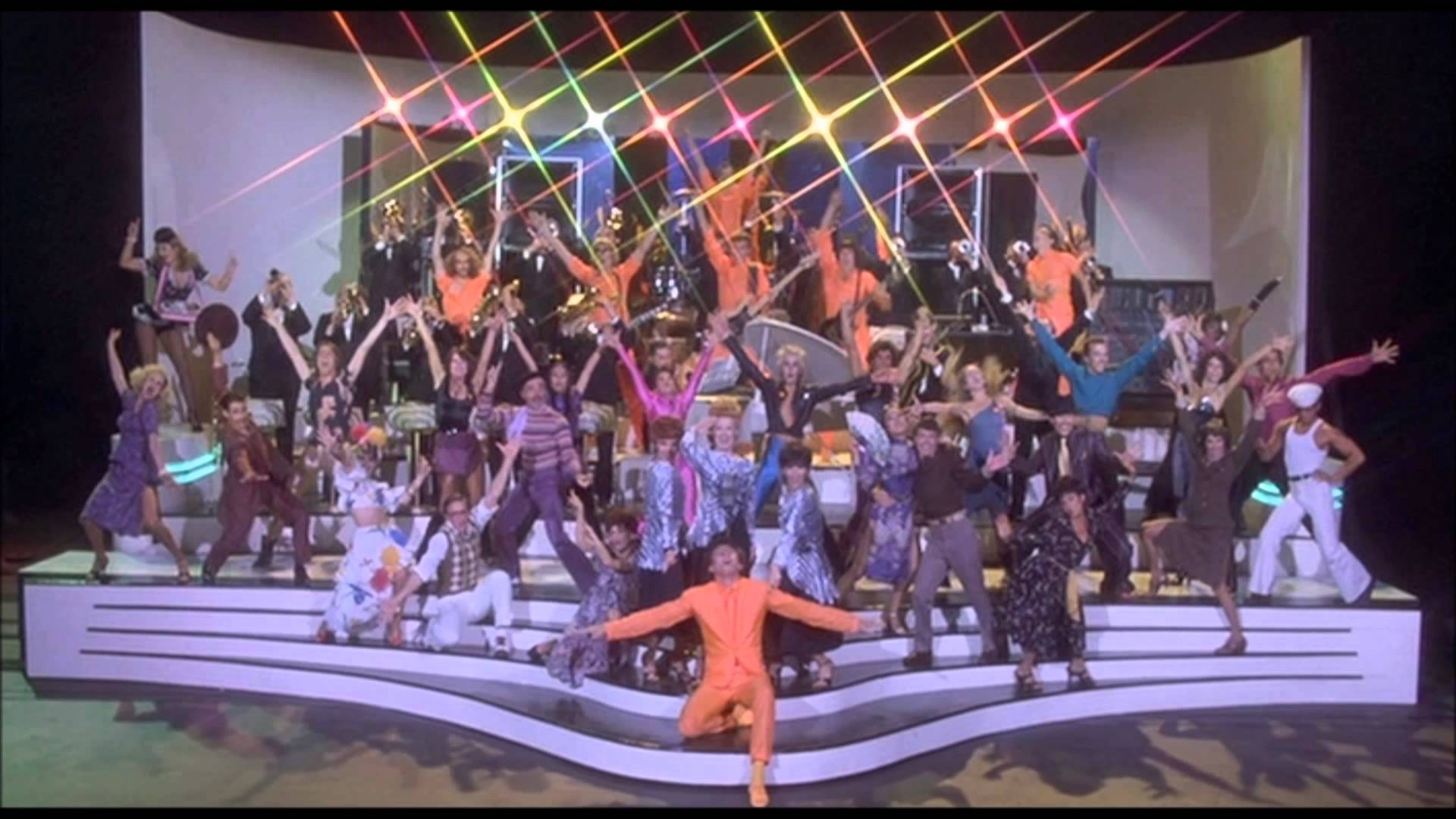By Christopher James

Have you ever watched a movie and realized it was instantly going to be part of your personality? Last weekend at a midnight screening of Xanadu, I thought I was merely filling a critical hole in my gay camp movie repertoire. The Olivia Newton John 1980 roller skating musical was a bomb when it first opened. Yet, through hit songs like “Magic” and “Xanadu,” the film hung around long enough to become a cult classic. Obviously the term “roller skating musical” doesn’t inspire much confidence in a film’s storytelling prowess. Xanadu isn’t a “so bad it’s good” curio piece. Instead, it’s an ambitious, messy, misunderstood masterpiece about the ebbs and flow of art and taste...

Yes, Xanadu’s plot doesn’t really hold water. Frustrated LA artist Sonny Malone (Michael Beck), barely characterized, tears up a sketch he’s been working on. This sketch floats towards a Venice mural of the Nine Murals of Olympus, bringing them to life. Eight of the nine muses rush back up to Olympus, while one, Kira (Olivia Newton-John), skates over to Sonny, kisses him and then skates away. Later that day at his soul-crushing album recreation job, Sonny notices Kira on the cover of this album, set in front of an art deco building. He runs out to find this building, hoping she will be there waiting for him. He’s correct! Kira leads him inside to the dilapidated building, telling him that it should be turned into a club - Xanadu. The two develop an instant connection talking through this dream nightclub.
Michael Beck’s performance as Sonny is comically obtuse. His floppy hair and giant grin makes him a believably idealistic artist, with a head filled with passion rather than brains. Though he looks the part and gives it his all, Beck’s Sonny is in an uncanny valley created by the plot. It’s hard to understand what his relationship is with magic throughout the film. Who was he before the muse and where is his authorial voice that she is investing in?

Beck’s idealistic blank slate is part of what makes Gene Kelly’s work so powerful. Kelly plays Danny McGuire, a construction titan who was once a conductor for a big band orchestra. Danny and Sonny are drawn together based on their shared love of Kira. Danny had loved Kira before, yet stopped creating music after she left. Xanadu is his last chance to experience the creative fulfillment he once had. Seeing Gene Kelly on roller skates is a sight that’s worth the price of admission. However, Kelly’s casting is a shrewd and essential component to the movie’s theme. Art moves forward, right past the artists that contribute to the tapestry of culture. Kelly was one of Hollywood’s biggest stars, cementing himself in history as the go-to song and dance man in films like An American in Paris, Singin in the Rain and many more. Xanadu would become Kelly’s last feature film, but also one of the few major roles he was cast in the last two decades of his career.
One of the strongest moments of the film comes midway as Danny and Sonny are brainstorming ideas for the club. Danny describes his favorite elements of the 40s big band era, nostalgically looking back at a world and culture he misses. Meanwhile, Sonny wants roller skates, subwoofers galore, bright lights and modern clothes. As the two men fuse their visions together, so too do the stages from each of their visions overlap. By the end of the number, there is this grand portrait of the past and the present. Gene Kelly had once defined and shaped movie musical cultures. Watching him wax on about the past carries a meta quality. It’s joyous to watch him interact with the inflection point of 70s and 80s culture. However, it’s even more interesting to watch him look back on his legacy and how it fits in with the present. Here, the present is represented by Olivia Newton-John, hot off the smash hit of Grease. She perfectly embodies the spirit of the movie, giving shape and meaning to this musical fusion of Xanadu. Aided by incredible songs from Electric Light Orchestra, Newton-John proves her star power was no fluke. Her (at the time) modern vision of Kira has the ability to shift over time. Now, it may be looked at as camp. However, Newton-John wisely takes the role seriously. She believes in the vision at the heart of "Xanadu," which is why we as an audience can be sold on it, no matter how messily definied it is the movie.

The opening of the club "Xanadu" represents a euphoric high for this effervescent musical. Sonny’s pleas have worked, and Kira is allowed to return to Earth for "a moment, or maybe forever." What follows is an ecstatic and joyful roller skating number. Xanadu was never about a literal love story with a Greek muse, and Kira’s relationship with Earth is beyond nebulous (either purposefully or by accident). Some moments are meant to sustain a person for a lifetime, be it a timeless memory or an inspiring totem to grab onto. Sonny sees Kira as a waitress at the club, believing that she has made the choice to stay with him on Earth. This happy ending is pat, but the emotional conclusion is resounding. The creative propulsion within Sonny will stay alive, even after "Xanadu".
Times will change and morph, but so too will Xanadu, for Xanadu is the fusion of culture. It’s past and present combined in a magical, cosmic package. The ending recalls the genius “Super Trouper” finale to Mamma Mia! Here We Go Again. For a brief, musical moment, time frames close in on one another, the dead arise, and we can party with our younger selves for one special night. It’s not literal, but emotional. Xanadu provoked an emotional response in me, at 2 AM in Hollywood. These fleeting moments - be they of personal fulfillment, artistic satisfaction or youthful joy - deserve to stick with a person and influence more art and enjoyment. Xanadu may not be a well-constructed movie, but it’s a rich, emotionally satisfying masterpiece that should be more widely appreciated, rather than mocked.
What are your favorite flops? Are you part of the Xanadu fandom?